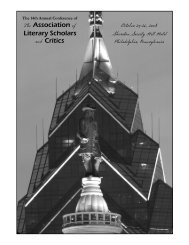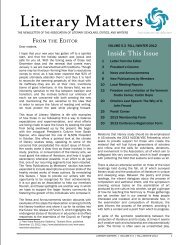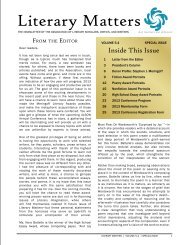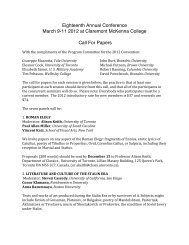Literary Matters - Association of Literary Scholars, Critics, and Writers
Literary Matters - Association of Literary Scholars, Critics, and Writers
Literary Matters - Association of Literary Scholars, Critics, and Writers
Create successful ePaper yourself
Turn your PDF publications into a flip-book with our unique Google optimized e-Paper software.
Neglected Authors Column:Rosanna Warren on Byron Herbert ReeceByron Herbert Reece (1917-1958) is a casualty <strong>of</strong>Modernism. Timeless even in his own day, this poet <strong>and</strong>novelist, born in a log cabin on a farm in the Appalachians<strong>of</strong> North Georgia, is almost unknown outside his nativestate. Yet readers anywhere who appreciate FrederickGoddard Tuckerman, Edward Arlington Robinson, EdwardThomas, John Masefield, <strong>and</strong> Robert Frost, as well astraditional English <strong>and</strong> Scottish ballads, would findnourishment in Reece’s poems.It is tempting to think <strong>of</strong> Reece as an American JohnClare. He grew up in a rural poverty as dire as any NorthAmerica can show, <strong>and</strong> spent his boyhood <strong>and</strong> most<strong>of</strong> his life laboring on the farm to support his parents,both <strong>of</strong> whom suffered from tuberculosis, a diseaseReece himself eventually contracted. Before enteringelementary school, he was already reading the Bible <strong>and</strong>The Pilgrim’s Progress, the two books his family owned.He did manage to attend high school while working on thefarm, <strong>and</strong> by his late teens was publishing poems in localnewspapers. Encouraged by the high school principal, heattended a local college, Young Harris College, for twoyears, <strong>and</strong> he clearly put those years to fervent good use,reading widely <strong>and</strong> beginning to publish in literary journalsbeyond Georgia. The needs <strong>of</strong> the farm prevented himfrom finishing his formal education. When war broke out,the Army rejected him because <strong>of</strong> his thinness <strong>and</strong> theprevalence <strong>of</strong> TB in his family. From 1939 to 1945, heworked eighteen hours a day on the farm <strong>and</strong> wrote “atnight.” After that, desperate for money, he interspersed alittle high school teaching, <strong>and</strong> then college teaching, withhis farm work <strong>and</strong> writing. In 1954 he spent three months(<strong>of</strong> Hell, he said) in the state hospital for the tubercular.Two Guggenheim fellowships helped him eke out a living,but his last years were spent in a desperate battle t<strong>of</strong>inish his third novel, produce new poems, teach, keepthe farm going, <strong>and</strong> survive his disease. He shot himselfin the spring <strong>of</strong> 1958 in the faculty apartment <strong>of</strong> his AlmaMater, Young Harris College, where he had a teachingstint that year. His biographer Bettie Sellers writes that heleft his last stack <strong>of</strong> student papers, graded, in his deskdrawer. Mozart’s Piano Sonata in D was spinning on therecord player.Reece published four books <strong>of</strong> poems <strong>and</strong> twonovels. He was not, in his day, a “neglected author.”Thanks to Jesse Stuart, a farmer-poet from Kentucky whodiscovered a poem <strong>of</strong> Reece’s in Prairie Schooner, theNew York publisher E.P. Dutton took him on; his work waswidely reviewed, <strong>and</strong> on the appearance <strong>of</strong> his novel Bettera Dinner <strong>of</strong> Herbs <strong>and</strong> his second book <strong>of</strong> poems, BowDown in Jericho <strong>and</strong> Other Poems in 1950, Newsweekpublished a feature article on him. He received awardsfrom the Georgia <strong>Writers</strong> <strong>Association</strong>. But the books didn’tsell well enough to support him <strong>and</strong> his parents, <strong>and</strong> theawards paid little. His other books <strong>of</strong> poems are: Ballad<strong>of</strong> the Bones <strong>and</strong> Other Poems (1945); A Song <strong>of</strong> Joy <strong>and</strong>Other Poems (1952); <strong>and</strong> The Season <strong>of</strong> Flesh (1955).His second novel, The Hawk <strong>and</strong> the Sun, also cameout in 1955. Two books have been written about him:Raymond A. Cook’s Mountain Singer: The Life <strong>and</strong> Legacy<strong>of</strong> Byron Herbert Reece (1985), <strong>and</strong> Bettie Sellers’ TheBitter Berry: the Life <strong>of</strong> Byron Herbert Reece (1992).Within the framework <strong>of</strong> his traditional metrics, usinga language drawn from the Bible, the Elizabethan poets,<strong>and</strong> Robinson <strong>and</strong> Housman (among others), as well asfrom the rich Appalachian oral traditions <strong>of</strong> song <strong>and</strong>storytelling that were natural to him, Reece paces hisspare <strong>and</strong> sober surprises. He was much praised for hisballads. It is the shorter lyrics that strike my ear, <strong>and</strong> myheart. The first stanza <strong>of</strong> “I Am the Dust” is unremarkablyconventional. The second stanza—especially the last fourlines with that vibrating word “traffic”—breaks into private,eerie, <strong>and</strong> original space.I Am the DustI am the dust made animate,Earth’s singer given syllables,As Homer <strong>of</strong> an elder date.For sorrow, joy <strong>and</strong> love <strong>and</strong> hateAnd greetings <strong>and</strong> farewells.Too soon I too shall be as quietAs they who know not how the nightIs dark nor how the day is clear,But for a fleeting moment yetI traffic with the alphabetBefore I am anonymousAnd scattered everywhere.“I Go by Ways <strong>of</strong> Rust <strong>and</strong> Flame” is beautifullyeconomical even in its repetitiveness, giving a quietsense <strong>of</strong> a l<strong>and</strong>scape known <strong>and</strong> lived (that “bent” sky,the roads that “thin at sunset to the air”), as well as thesolitude that seems to have been the essential condition<strong>of</strong> this poet.I Go by Ways <strong>of</strong> Rust <strong>and</strong> FlameI go by ways <strong>of</strong> rust <strong>and</strong> flameBeneath the bent <strong>and</strong> lonely sky;Behind me on the ways I cameI see the hedges lying bare,But neither question nor reply.LITERARY MATTERS | VOLUME 3.4 | YEAR-END 2010 14







